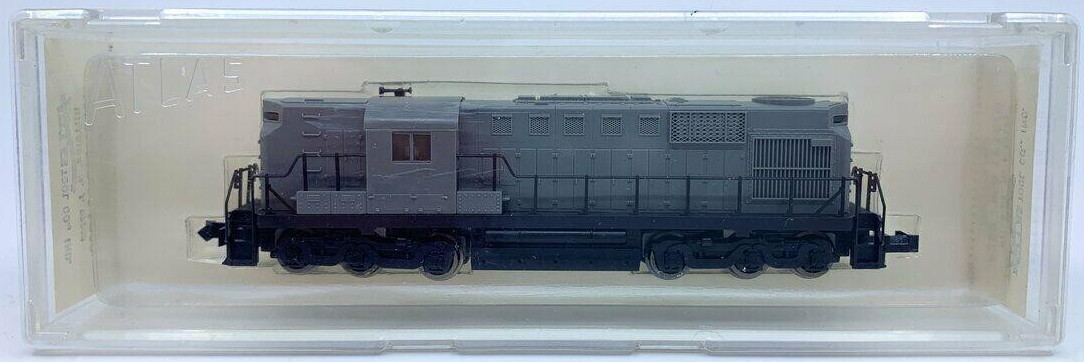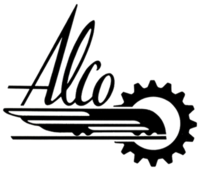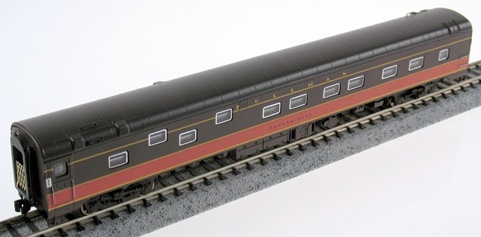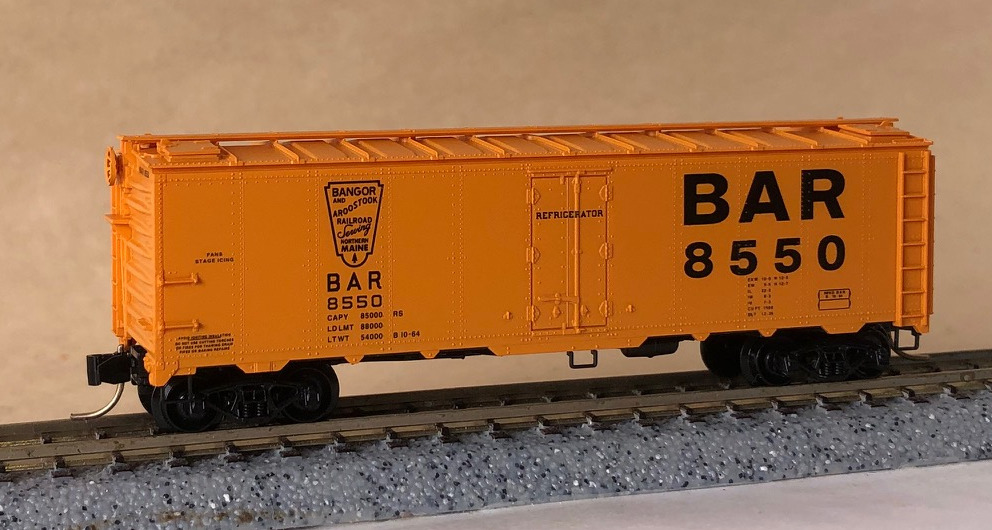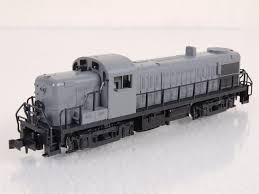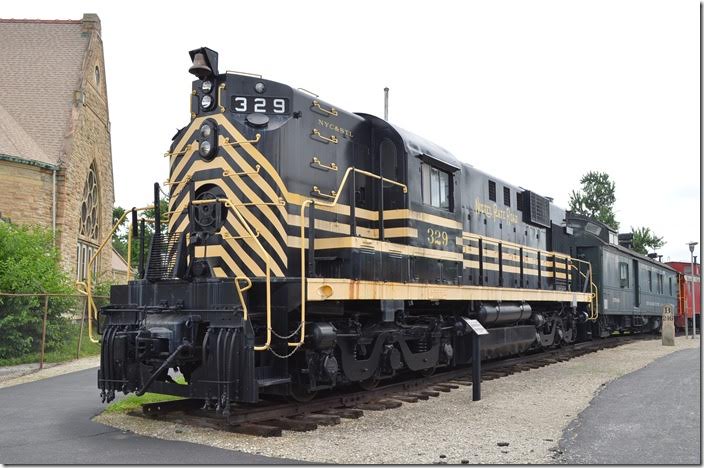Model Information: This model was made by Kato for Atlas from 1987 through the mid 1990s when Atlas ceased farming out production of their locomotives to Kato. The model is a bit of a kluj re-using parts from the Atlas/Kato RS-3, RSD-4/5 and RS-11 models. It is a split-frame design with two lightboards, but no flywheels, making it a second generation locomotive. This model has never been run by Atlas since they ceased production with Kato. Likely it simply didn't sell as well as the other similar models and was never viewed as being worth a proper re-tooling into a 3rd generation model.
Atlas boxes were labeled 'Special Limited Edition'. Kato also sold this model under its brand name with reference 17717; it was packaged in Kato blue boxes.
All models are marked "Kato. 17717. Made in Japan" under the fuel tank.
Atlas boxes were labeled 'Special Limited Edition'. Kato also sold this model under its brand name with reference 17717; it was packaged in Kato blue boxes.
All models are marked "Kato. 17717. Made in Japan" under the fuel tank.
DCC Information: Given the dual-lightboard design, it is possible to add DCC to these models. Perhaps the TCS decoders used for other Atlas dual-lightboard mechanisms will work....
Prototype History: The ALCO RSD-12 was a diesel-electric locomotive of the road switcher type rated at 1,800 horsepower (1.34 MW), that rode on three-axle trucks, having an C-C wheel arrangement.
Used in much the same manner as its four-axle counterpart, the ALCO RS-11, though the six-motor design allowed better tractive effort at lower speeds.
A total of 171 RSD-12 were built by Alco and MLW, with more than a hundred purchased by Mexican and Brazilian companies.
From Wikipedia
Read more on American-Rails.com.
Used in much the same manner as its four-axle counterpart, the ALCO RS-11, though the six-motor design allowed better tractive effort at lower speeds.
A total of 171 RSD-12 were built by Alco and MLW, with more than a hundred purchased by Mexican and Brazilian companies.
From Wikipedia
Read more on American-Rails.com.
Road Name History: 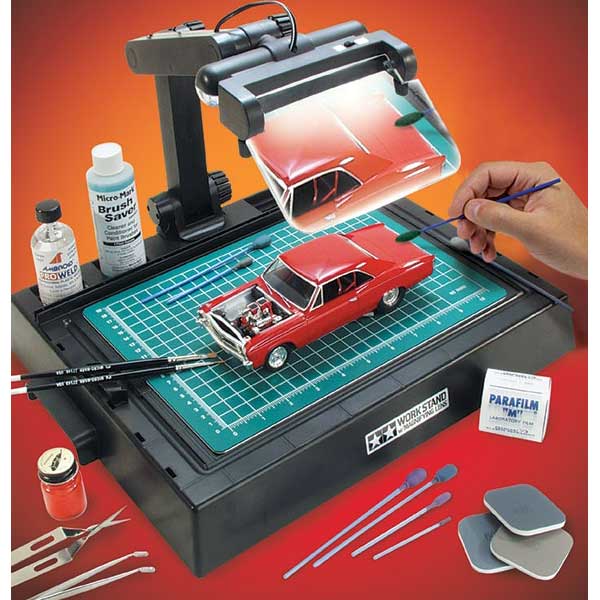 Although they may be molded in color, unpainted and unlettered, undecorated products are marketed to modelers who seek to custom decorate their models for private roads and/or road and/or company names that were not commercially produced by any of the major manufacturers.
Although they may be molded in color, unpainted and unlettered, undecorated products are marketed to modelers who seek to custom decorate their models for private roads and/or road and/or company names that were not commercially produced by any of the major manufacturers.
Undecorated models are frequently also unassembled or only partially assembled and required modelers to be comfortable with glue, paint and sometimes solder in order to prepare their models for display. Materials for these models can vary but often include plastic, pewter and resin. Models may or may not come with decals or other decorations such as plastic signage, railings and ladders to enhance the appearance of the final product.

Undecorated models are frequently also unassembled or only partially assembled and required modelers to be comfortable with glue, paint and sometimes solder in order to prepare their models for display. Materials for these models can vary but often include plastic, pewter and resin. Models may or may not come with decals or other decorations such as plastic signage, railings and ladders to enhance the appearance of the final product.
Brand/Importer Information: In 1924 Stephan Schaffan, Sr. founded the Atlas Tool Company in Newark, New Jersey. In 1933 his son, Stephan Schaffan, Jr., came to work for his father at the age of sixteen. Steve Jr. built model airplanes as a hobby and frequented a local hobby shop. Being an enterprising young man, he would often ask the owner if there was anything he could do to earn some extra spending money. Tired of listening to his requests, the hobby-store owner threw some model railroad track parts his way and said, "Here, see if you can improve on this".
In those days, railroad modelers had to assemble and build everything from scratch. Steve Jr. created a "switch kit" which sold so well, that the entire family worked on them in the basement at night, while doing business as usual in the machine shop during the day.
Subsequently, Steve Jr. engineered the stapling of rail to fiber track, along with inventing the first practical rail joiner and pre-assembled turnouts and flexible track. All of these products, and more, helped to popularize model railroading and assisted in the creation of a mass-market hobby. The budding entrepreneur quickly outgrew the limitations of a basement and small garage operation. Realizing they could actually make a living selling track and related products, Steve and his father had the first factory built in Hillside, New Jersey at 413 Florence Avenue in 1947. On September 30, 1949, the Atlas Tool Company was officially incorporated as a New Jersey company.
In 1985, Steve was honored posthumously for his inventions by the Model Railroad Industry Association and was inducted into the Model Railroad Industry Hall of Fame in Baltimore, Maryland. In addition, Steve was nominated and entered into the National Model Railroad Association Pioneers of Model Railroading in 1995.
In the early 1990s, the Atlas Tool Company changed its name to Atlas Model Railroad Company, Inc.
In those days, railroad modelers had to assemble and build everything from scratch. Steve Jr. created a "switch kit" which sold so well, that the entire family worked on them in the basement at night, while doing business as usual in the machine shop during the day.
Subsequently, Steve Jr. engineered the stapling of rail to fiber track, along with inventing the first practical rail joiner and pre-assembled turnouts and flexible track. All of these products, and more, helped to popularize model railroading and assisted in the creation of a mass-market hobby. The budding entrepreneur quickly outgrew the limitations of a basement and small garage operation. Realizing they could actually make a living selling track and related products, Steve and his father had the first factory built in Hillside, New Jersey at 413 Florence Avenue in 1947. On September 30, 1949, the Atlas Tool Company was officially incorporated as a New Jersey company.
In 1985, Steve was honored posthumously for his inventions by the Model Railroad Industry Association and was inducted into the Model Railroad Industry Hall of Fame in Baltimore, Maryland. In addition, Steve was nominated and entered into the National Model Railroad Association Pioneers of Model Railroading in 1995.
In the early 1990s, the Atlas Tool Company changed its name to Atlas Model Railroad Company, Inc.
Item created by: gdm on 2018-08-11 12:41:39. Last edited by gdm on 2020-07-24 07:29:19
If you see errors or missing data in this entry, please feel free to log in and edit it. Anyone with a Gmail account can log in instantly.
If you see errors or missing data in this entry, please feel free to log in and edit it. Anyone with a Gmail account can log in instantly.


